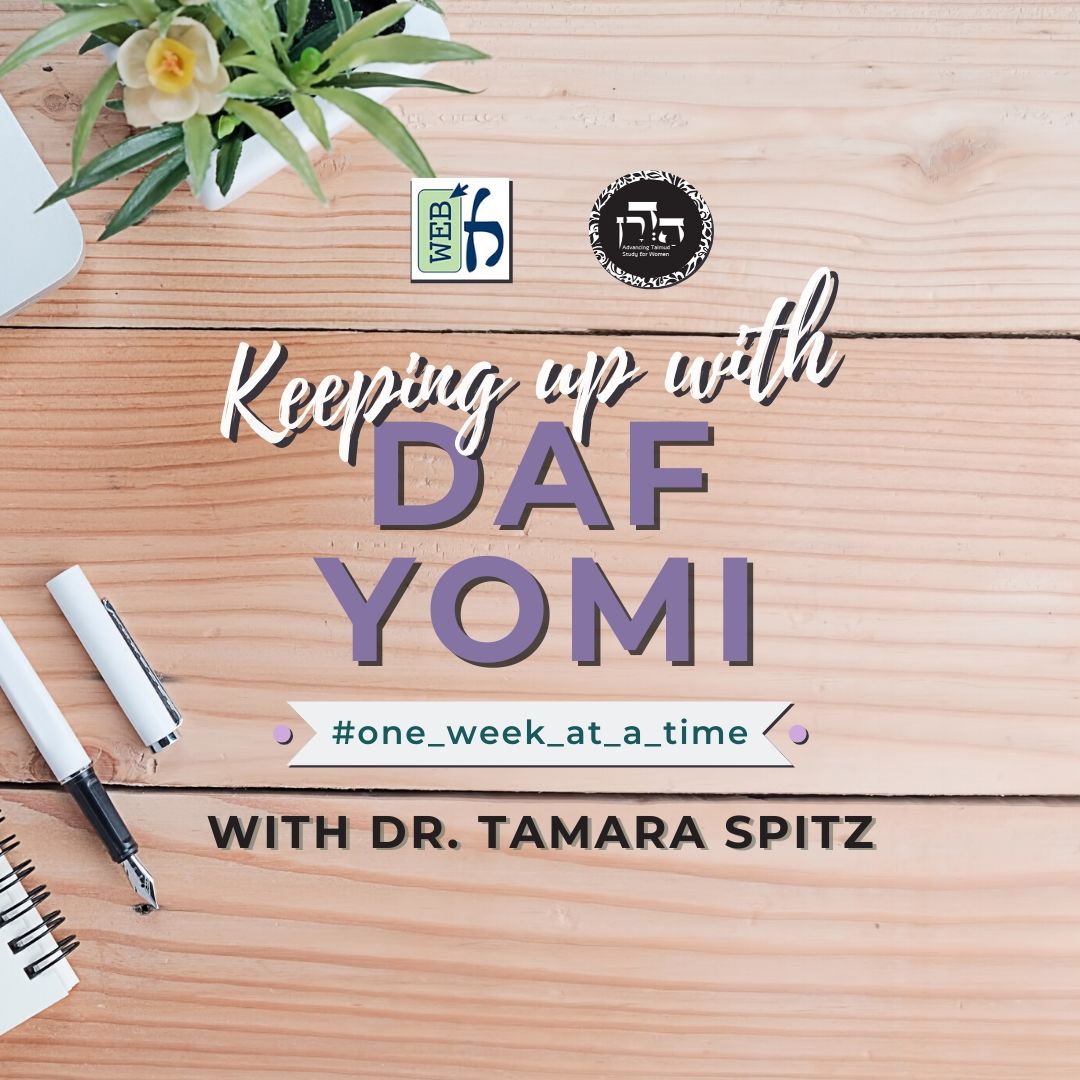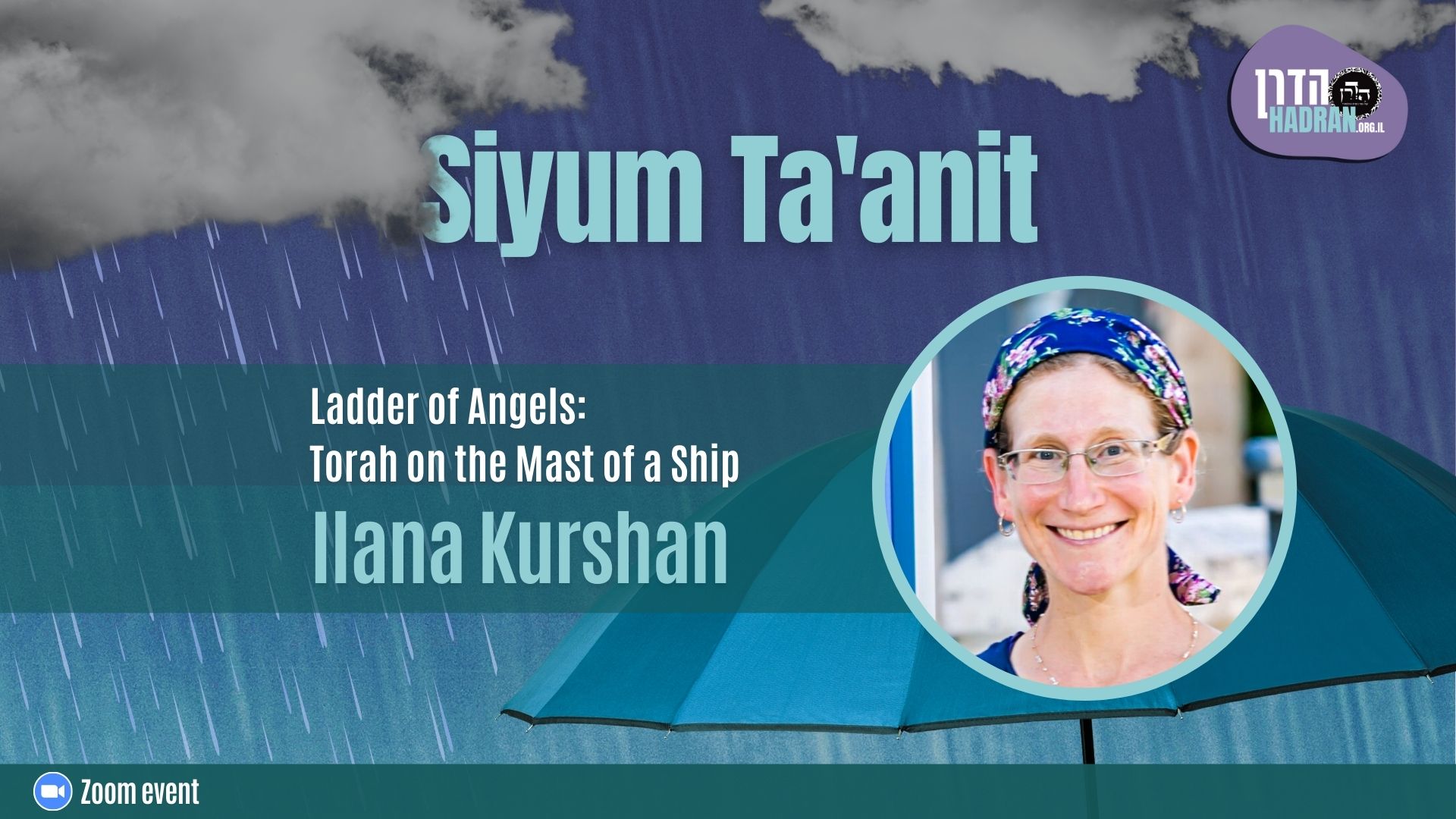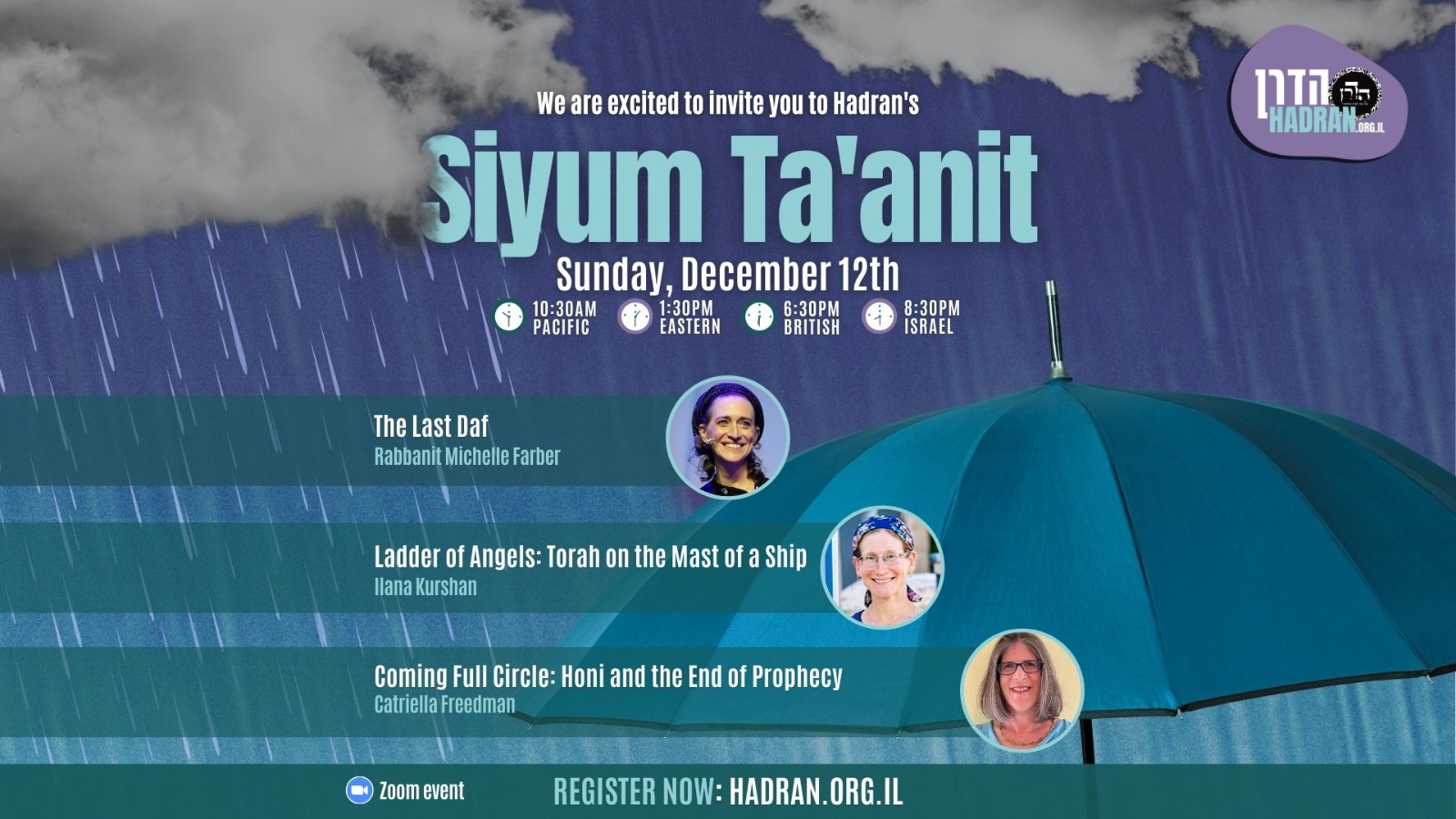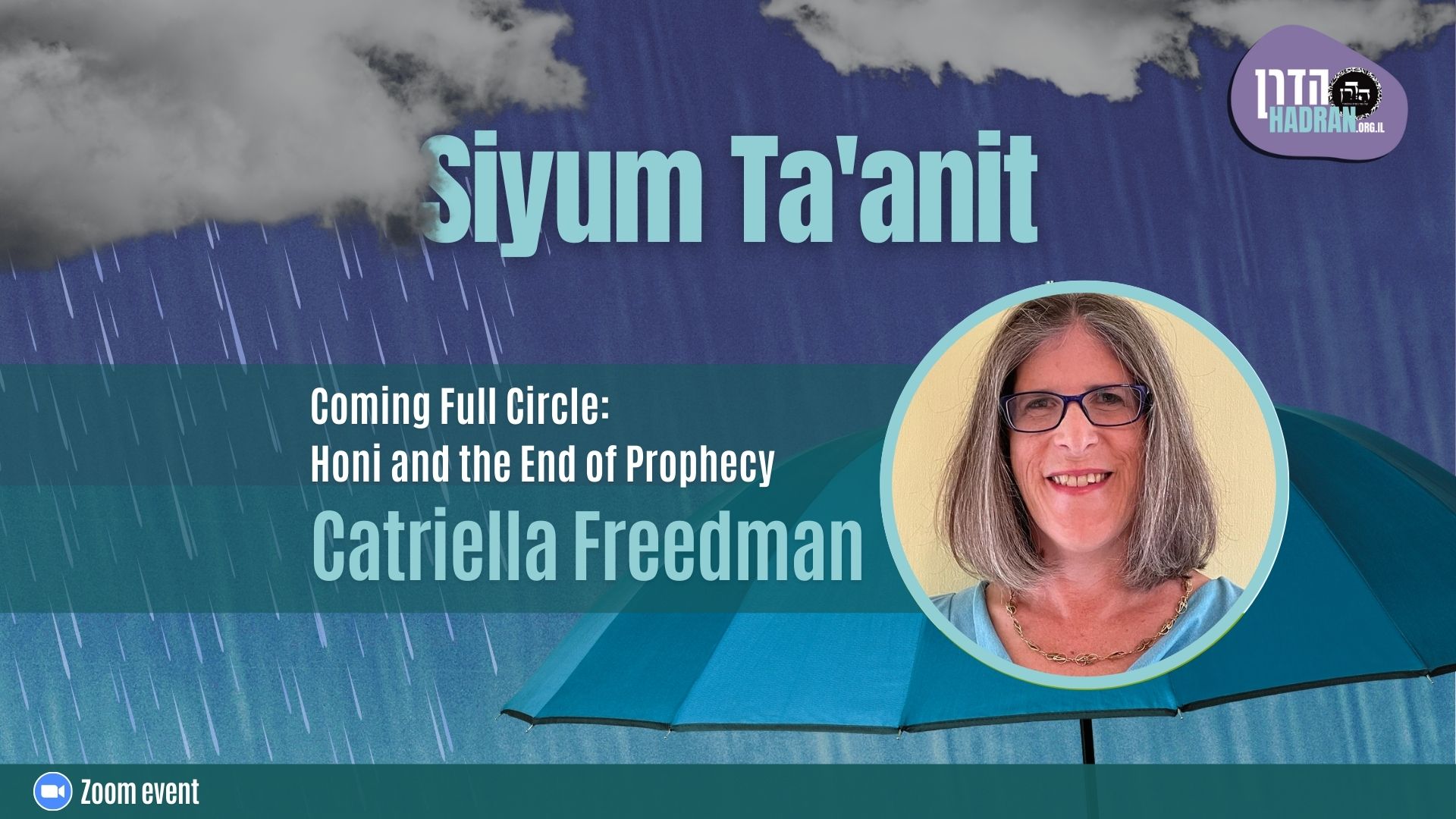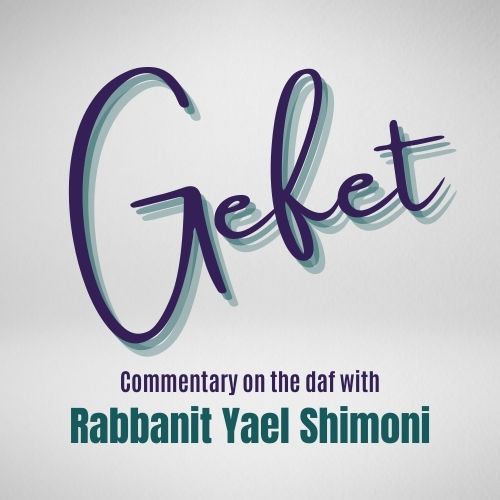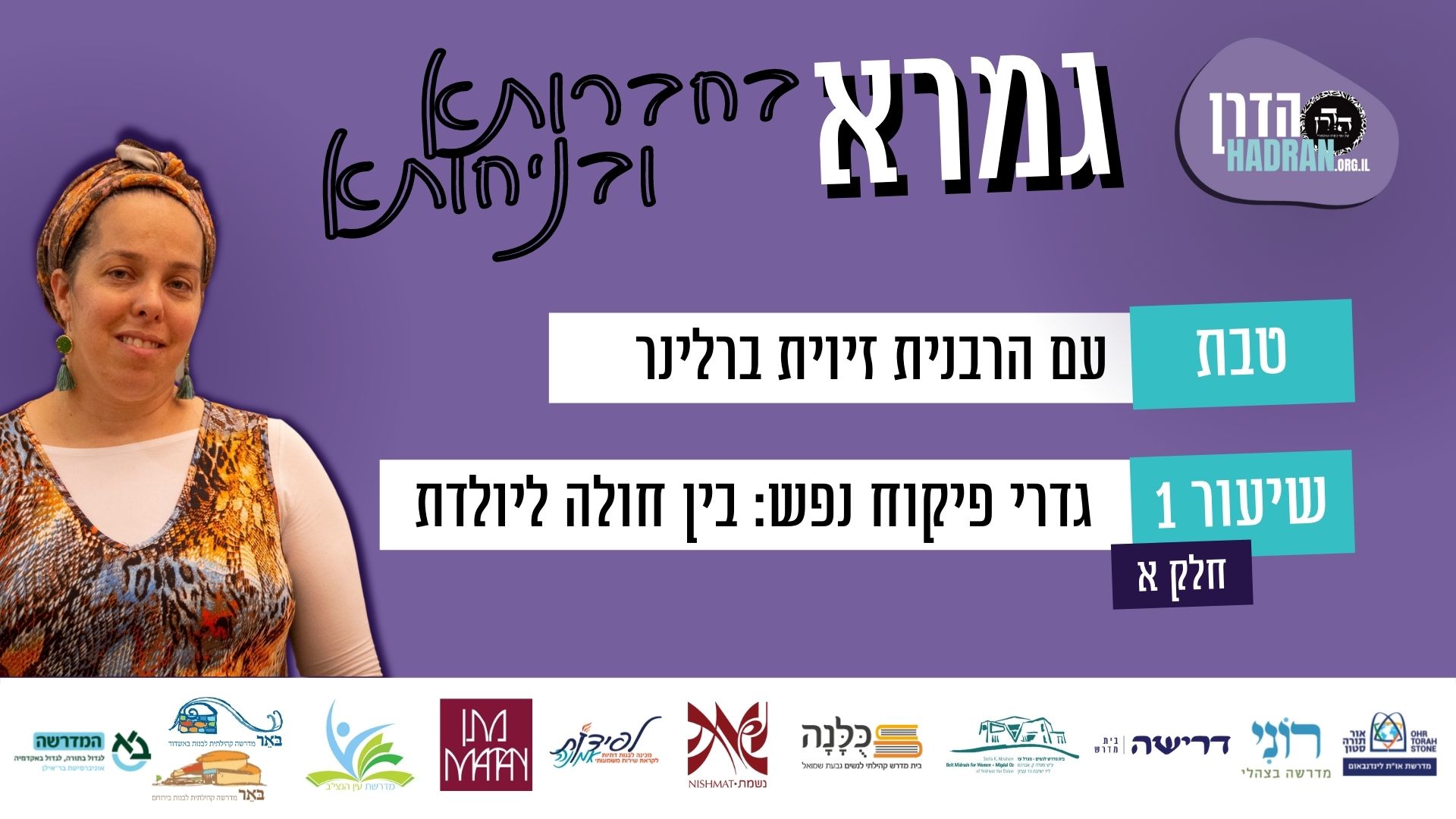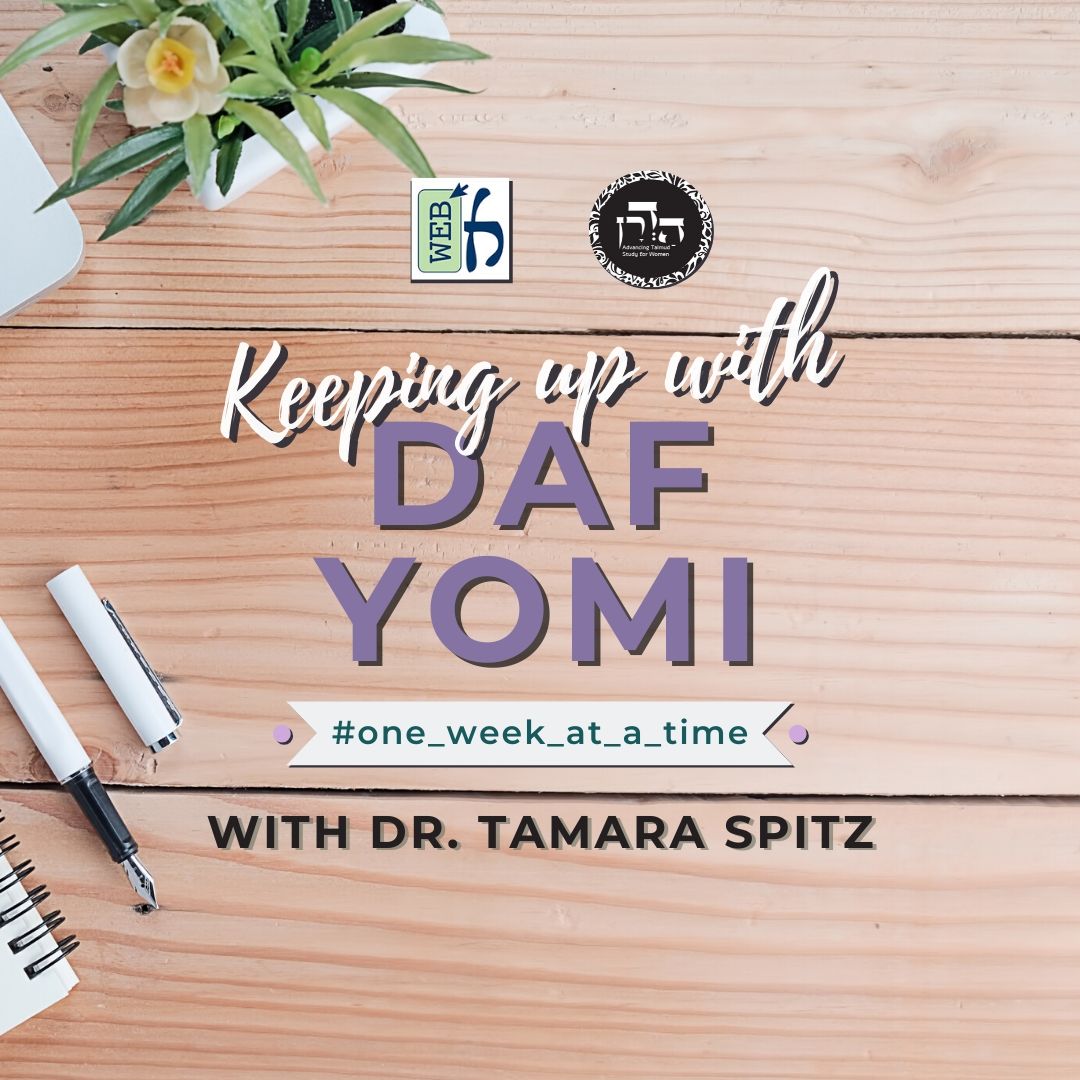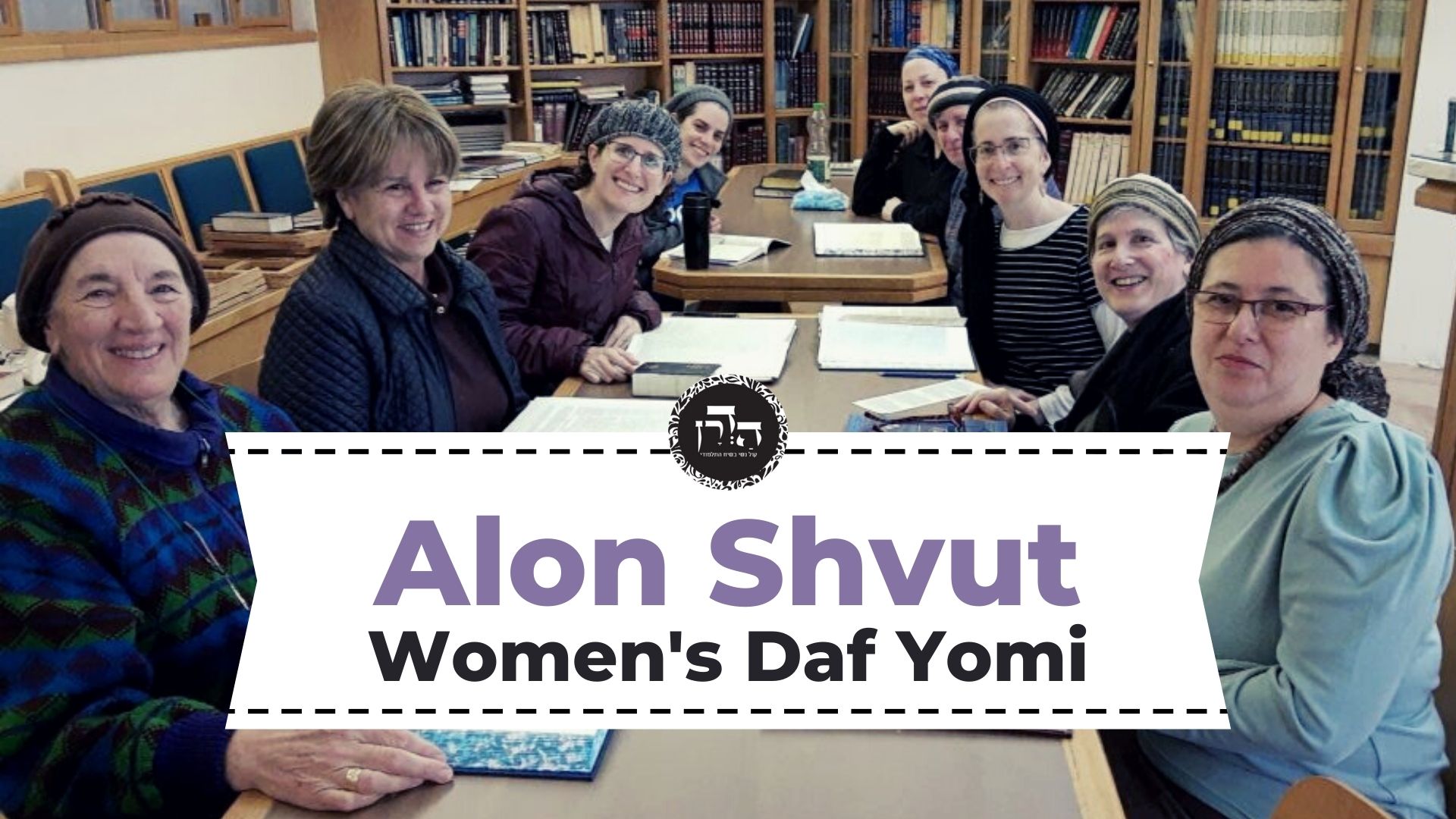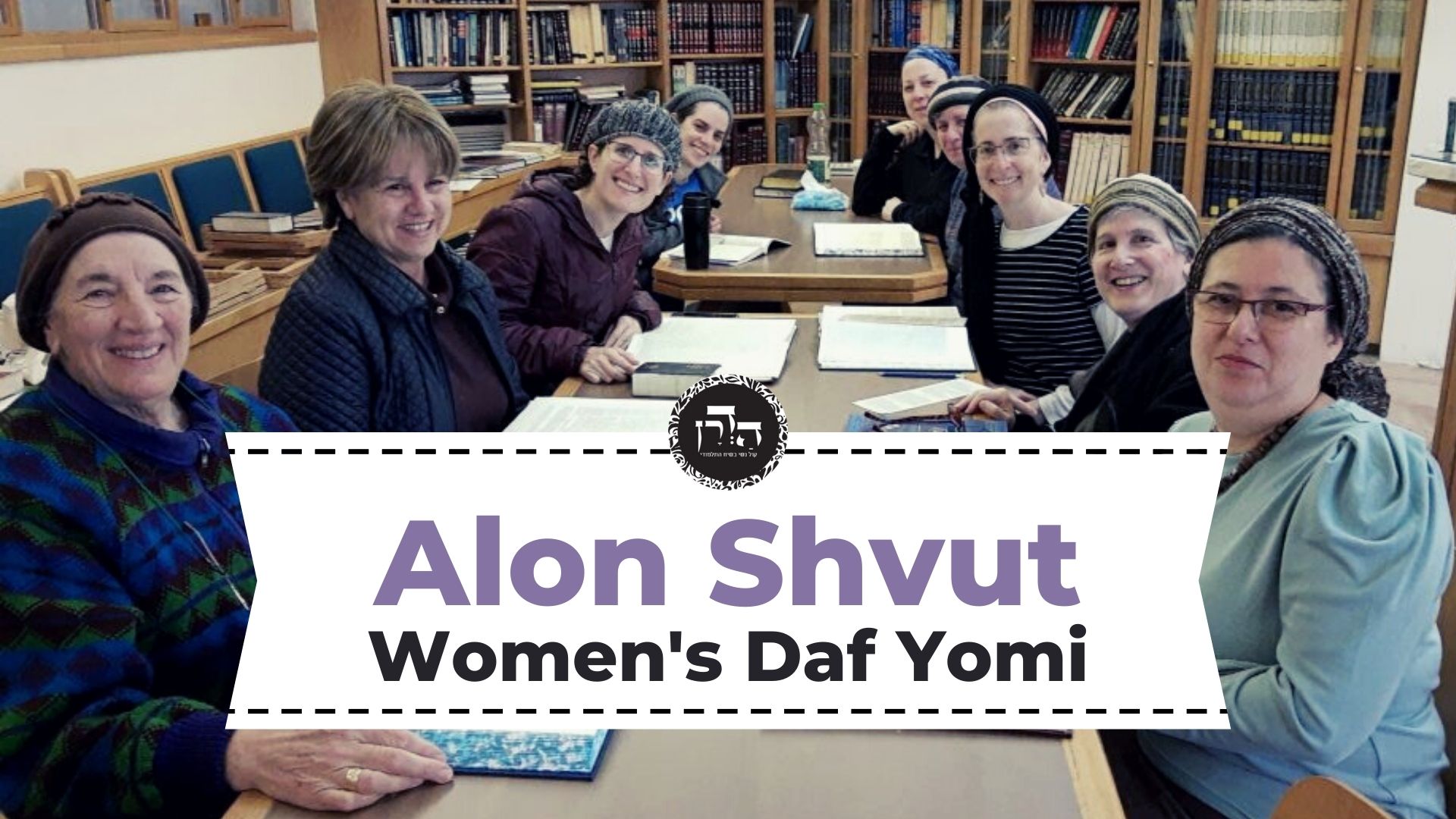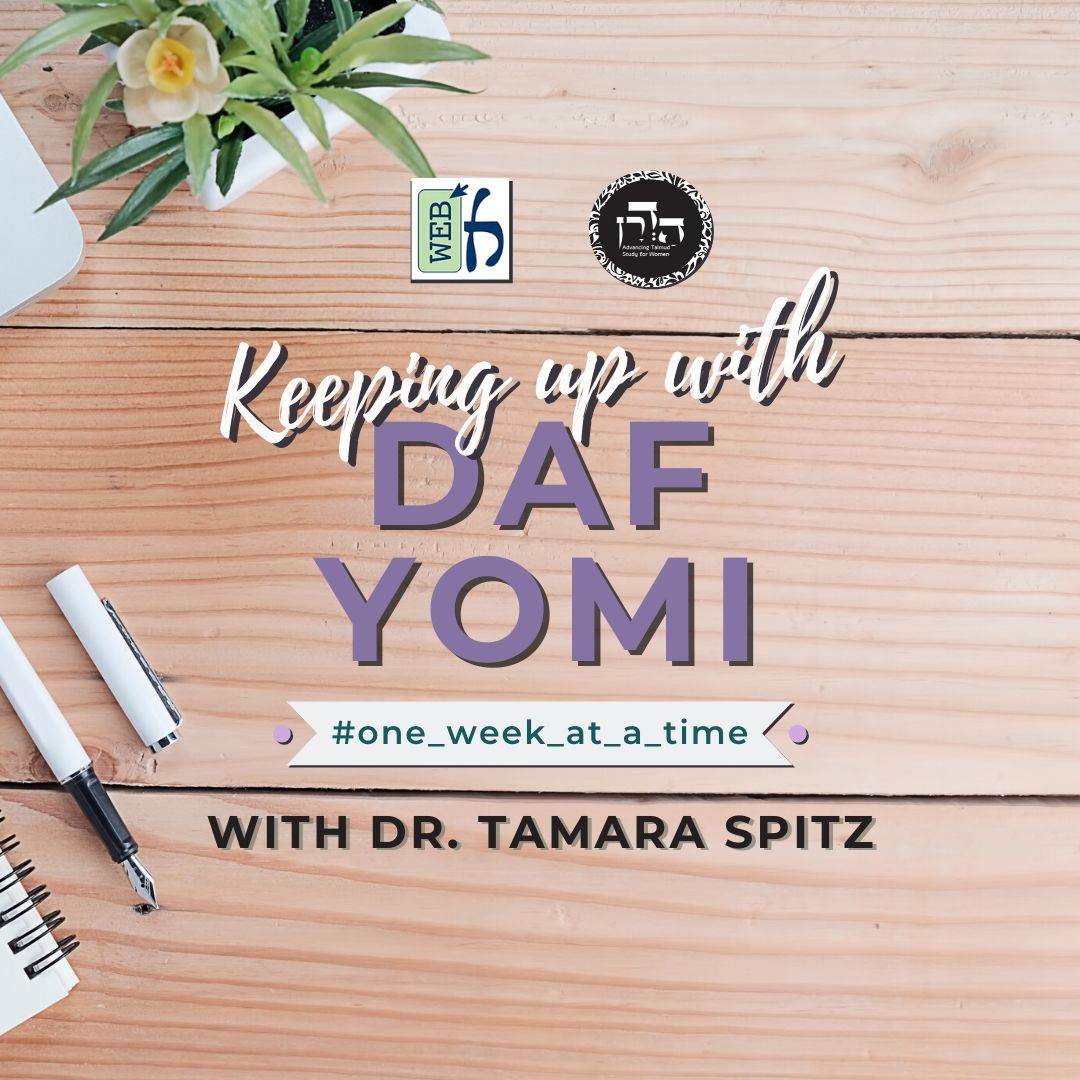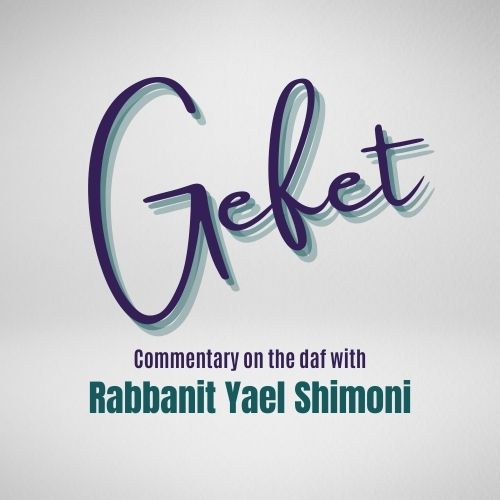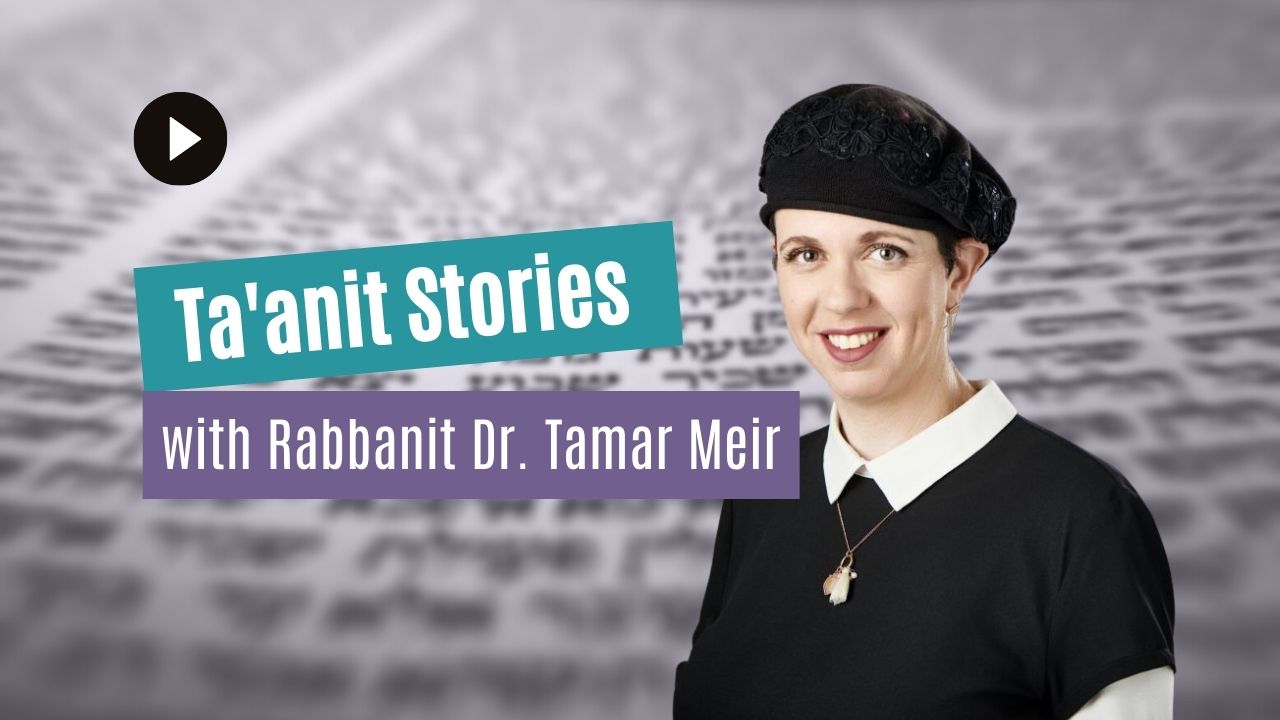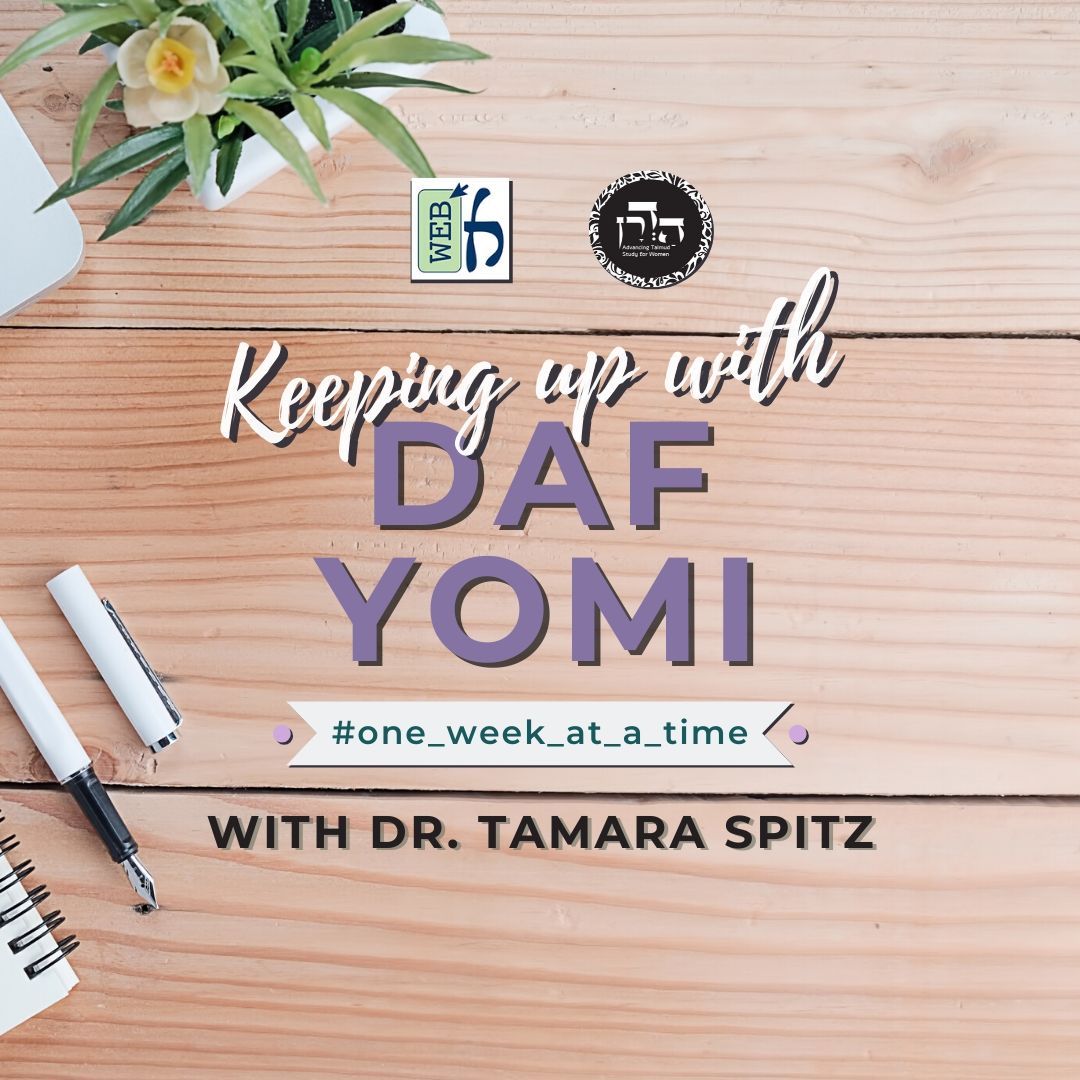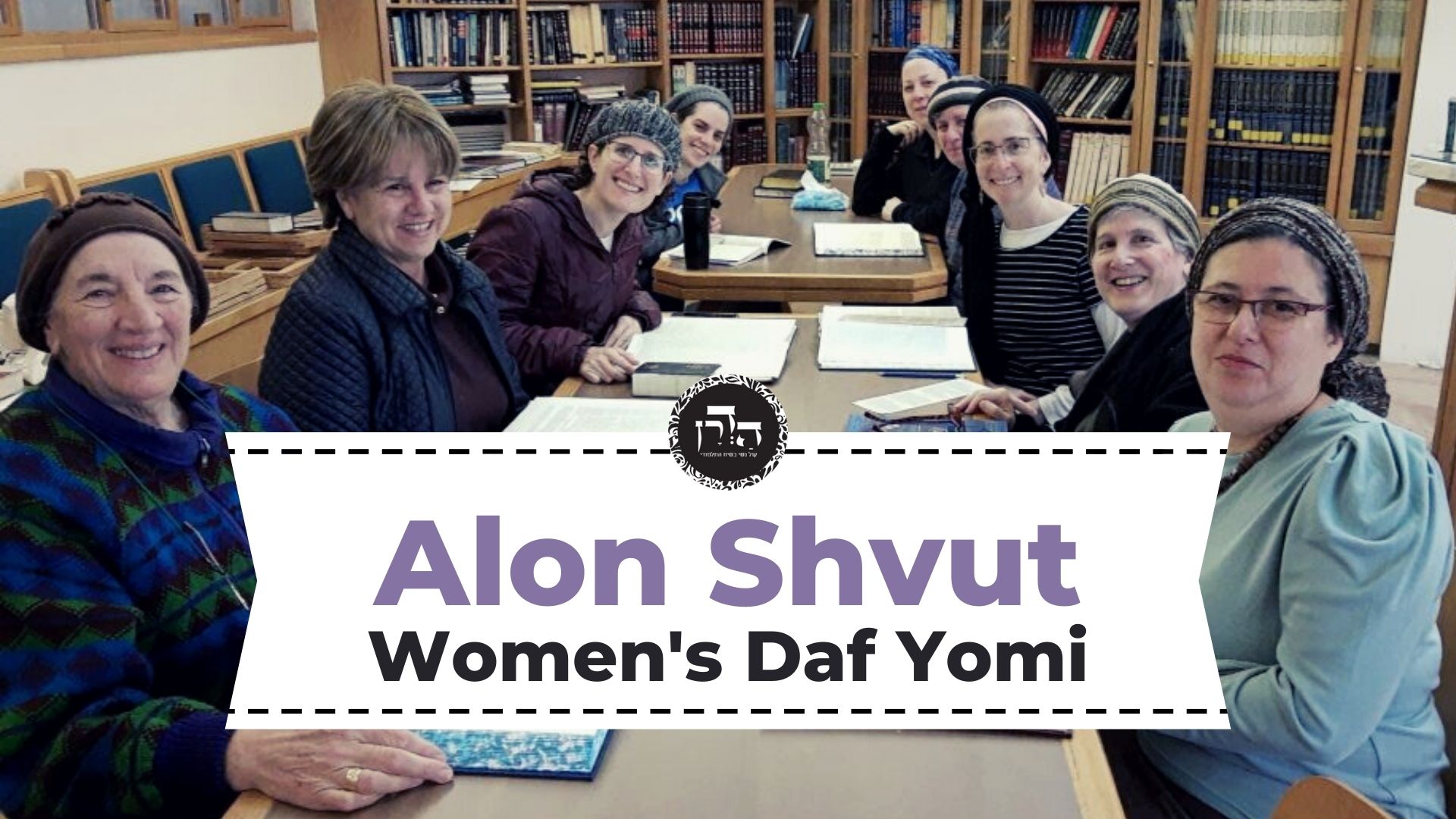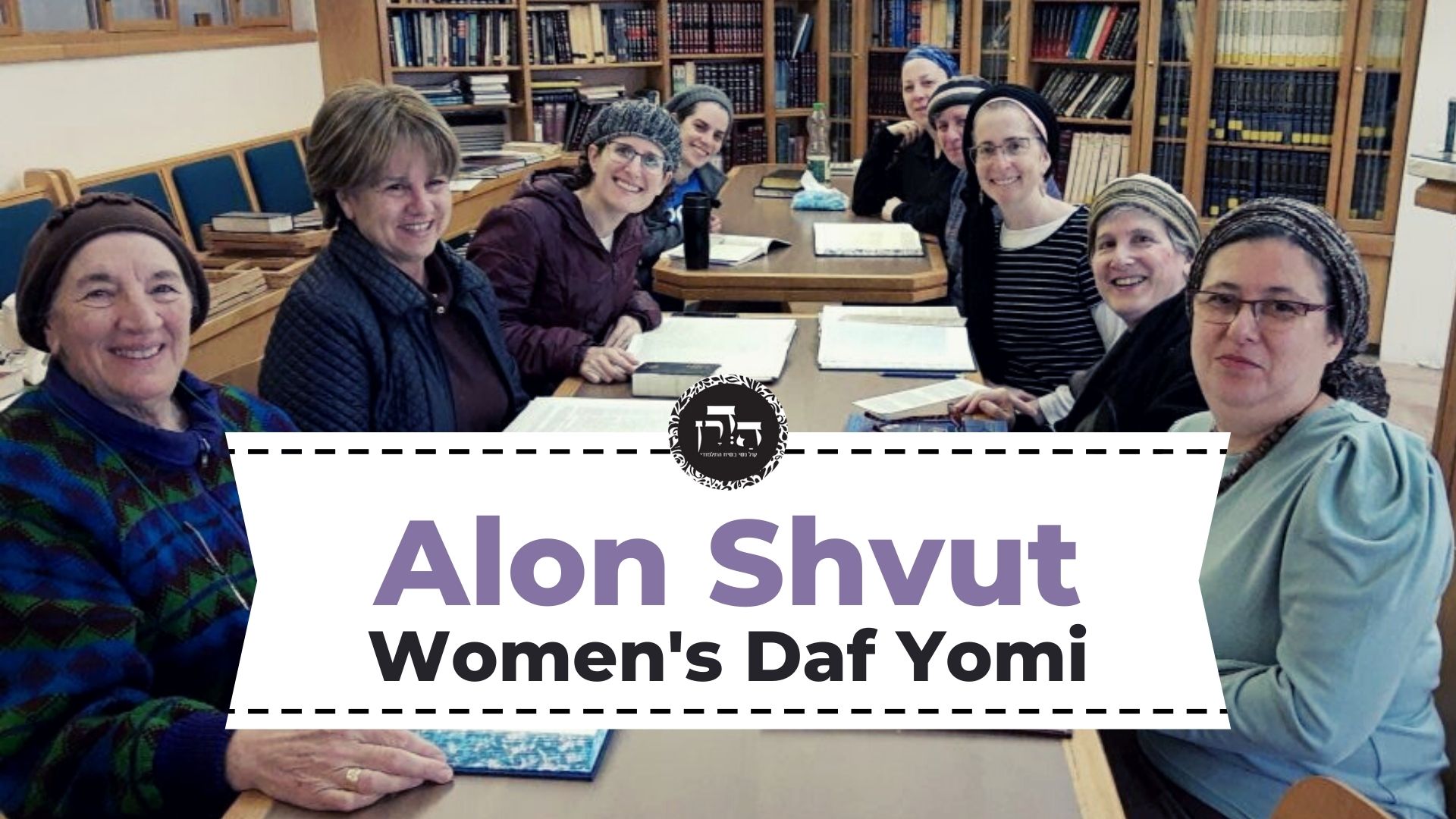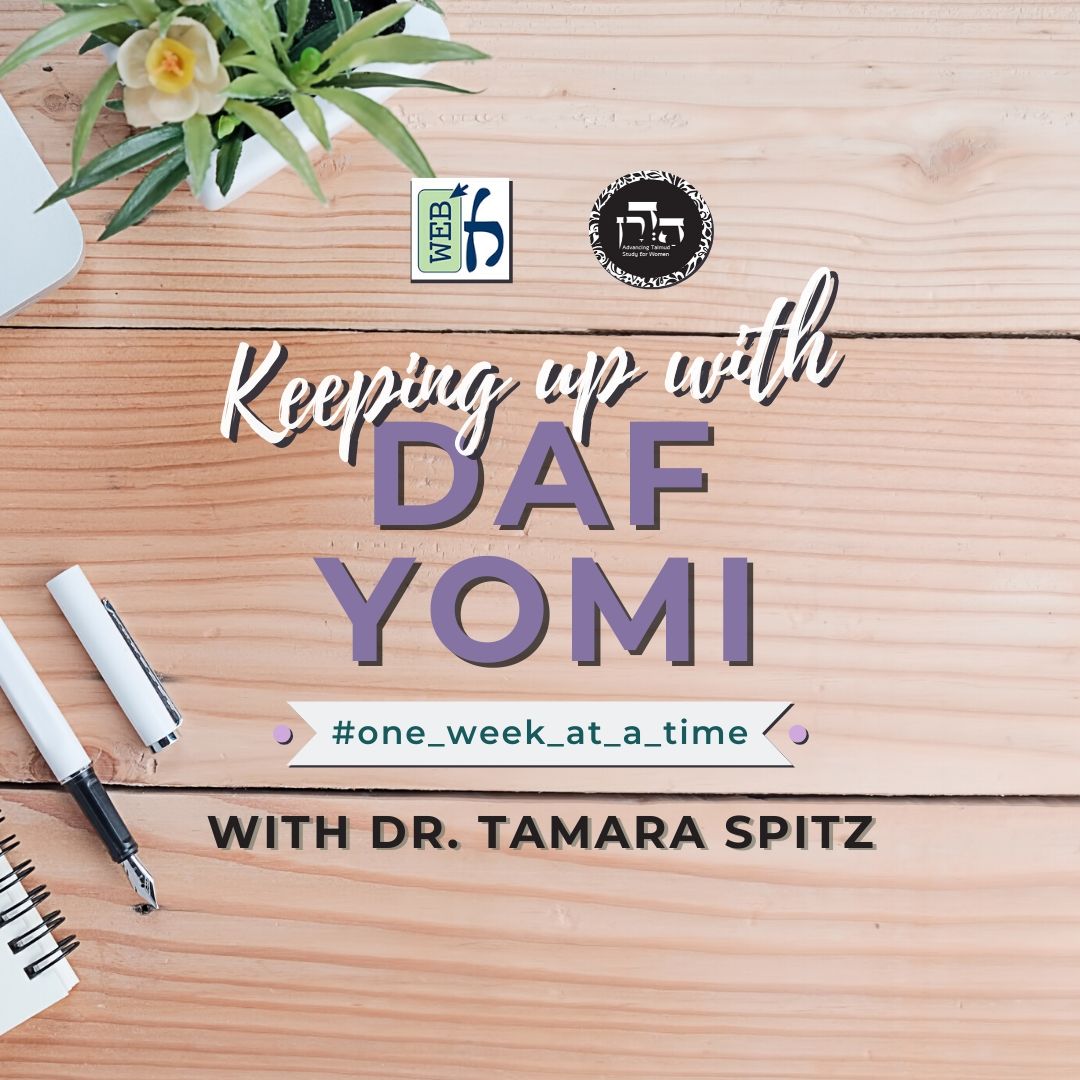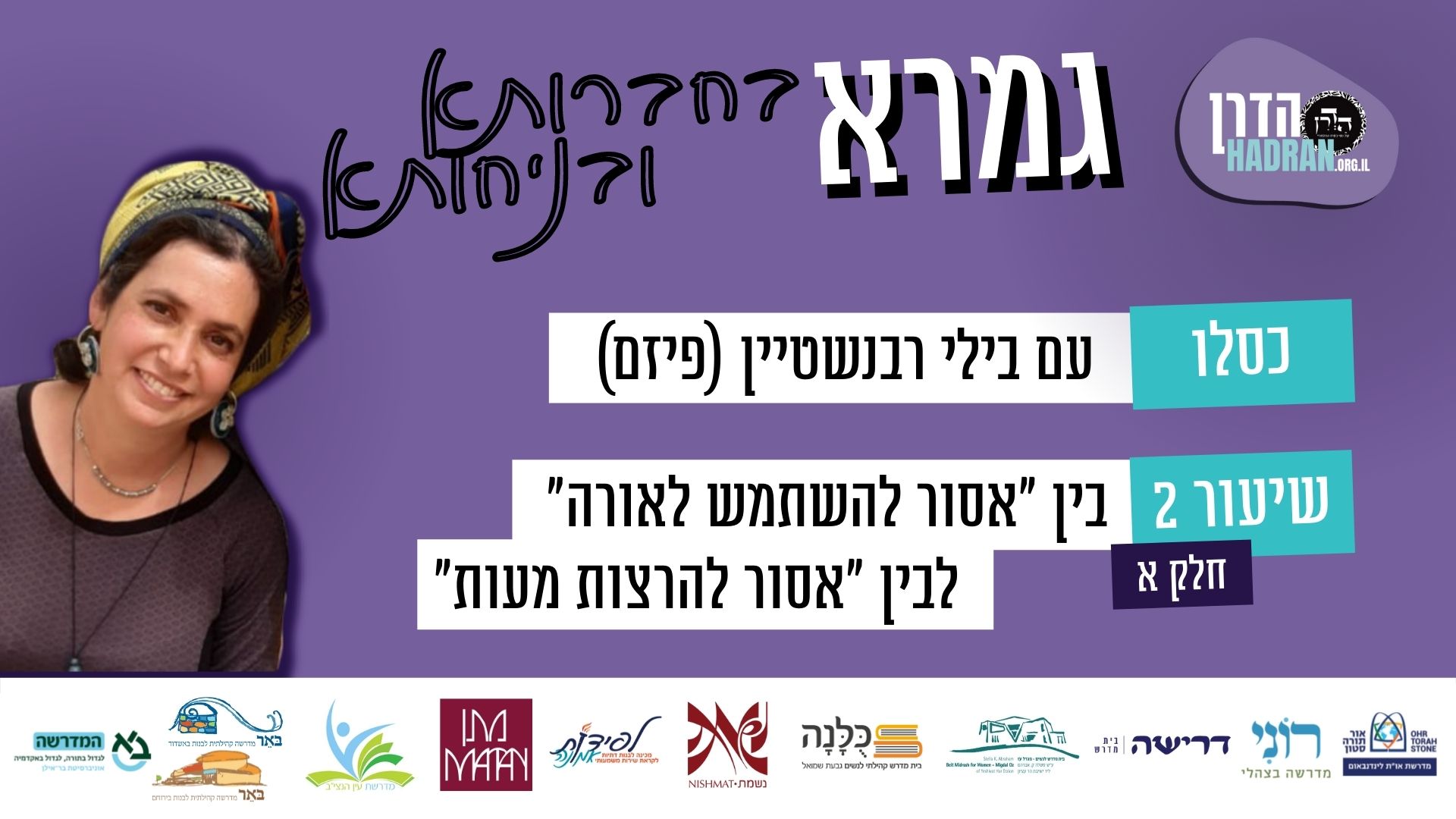Taanit 11
Share this shiur:
This month’s learning is dedicated to the refuah shleima of our dear friend, Phyllis Hecht, גיטל פעשא בת מאשה רחל by all her many friends who love and admire her. Phyllis’ emuna, strength, and positivity are an inspiration.
Want to dedicate learning? Get started here:


Summary
One who is traveling should eat small amounts of food either because it is not good for one’s intestines or because the food will run out. In what cases will there be a difference in practice between these two reasons? In case of a famine, one should not engage in sexual relations, unless the couple has no children yet. If one has means while there is a famine in the community, it is forbidden to remove oneself from the community and ignore what others are going through. People like that will not be included when the community is ultimately consoled. The Gemara calls such a person “beinoni.” Who is considered evil? An evil person’s conduct in a famine causes the death of the righteous. Why? What is the reward for one who includes oneself in the community’s suffering? An example is taken from Moshe in the Amalekite war. Who testifies against a person who does not act in this manner? Who will know what one does behind closed doors? There are several possibilities – the stones and beams of one’s house, the two angels who accompany a person, one’s soul, or one’s organs. The righteous are punished for minor transgressions, the wicked are rewarded for minor commandments, and a person justifies his judgment on the Day of Judgment at the end of his life. Is it considered a positive thing for a person to fast or is it something not recommended? There are two approaches to this and they are derived from the nazir. It says by a nazir “who has sinned against the soul.” Is he a sinner because he vowed not to drink wine or is it just referring to a nazir who became impure to a dead person? One suggests that there are two types of people – those who can tolerate fasting and those who can not and the law is different for each. Talmud scholars are not allowed to fast because it will prevent them from learning Torah. There are no severe level fast days Babylonia other than Tisha B’Av. If one, after fasting a whole day, decided to continue the fast until the next morning, would he/she say the prayer aneinu the next day? Does it depend on whether one holds there is/is not such a thing as fasting for a few hours
Today’s daily daf tools:
This month’s learning is dedicated to the refuah shleima of our dear friend, Phyllis Hecht, גיטל פעשא בת מאשה רחל by all her many friends who love and admire her. Phyllis’ emuna, strength, and positivity are an inspiration.
Today’s daily daf tools:
Delve Deeper
Broaden your understanding of the topics on this daf with classes and podcasts from top women Talmud scholars.
New to Talmud?
Check out our resources designed to help you navigate a page of Talmud – and study at the pace, level and style that fits you.
The Hadran Women’s Tapestry
Meet the diverse women learning Gemara at Hadran and hear their stories.
Taanit 11
דְּיָתֵיב בְּאַרְבָּא. אִי נָמֵי, דְּקָאָזֵיל מֵאַוּוֹנָא לְאַוּוֹנָא.
is in a case where he is sitting in a boat. The traveler must be concerned about his food supply, but he need not worry that the jostling of the road might force him to exert himself, which has a tendency to cause digestive problems. Alternatively, the practical difference is in a case where he is traveling from station [avna] to station. Here the exertion of the road might cause digestive problems, but one need not be concerned about running out of food, as he can resupply along the way.
רַב פָּפָּא — כׇּל פַּרְסָה וּפַרְסָה אָכֵיל חֲדָא רִיפְתָּא. קָסָבַר, מִשּׁוּם מַעְיָינָא.
The Gemara relates that when Rav Pappa traveled, along each and every parasang he would eat one loaf of bread. Rav Pappa did so because he maintained that the prohibition was due to the bowels, and as he was healthy he was not concerned that travel by road would irritate his digestion.
אָמַר רַב יְהוּדָה אָמַר רַב: כׇּל הַמַּרְעִיב עַצְמוֹ בִּשְׁנֵי רְעָבוֹן, — נִיצָּל מִמִּיתָה מְשׁוּנָּה, שֶׁנֶּאֱמַר: ״בָּרָעָב פָּדְךָ מִמָּוֶת״. ״מֵרָעָב״ מִיבְּעֵי לֵיהּ, אֶלָּא הָכִי קָאָמַר: בִּשְׂכַר שֶׁמַּרְעִיב עַצְמוֹ בִּשְׁנֵי רְעָבוֹן — נִיצּוֹל מִמִּיתָה מְשׁוּנָּה.
Rav Yehuda said that Rav said: Anyone who has food for himself but nevertheless starves himself in years of famine will be saved from an unusual death, as it is stated: “In famine, He will redeem you from death” (Job 5:20). This is derived from the precise wording of the verse. According to its straightforward meaning, instead of “in famine,” it should have said: From famine, as one is delivered from famine. Rather, this is what the verse is saying: As a reward for starving himself in years of famine, Job will be saved from an unusual death.
אָמַר רֵישׁ לָקִישׁ: אָסוּר לְאָדָם לְשַׁמֵּשׁ מִטָּתוֹ בִּשְׁנֵי רְעָבוֹן, שֶׁנֶּאֱמַר: ״וּלְיוֹסֵף יֻלַּד שְׁנֵי בָנִים בְּטֶרֶם תָּבוֹא שְׁנַת הָרָעָב״. תָּנָא: חֲסוּכֵי בָּנִים מְשַׁמְּשִׁין מִטּוֹתֵיהֶן בִּשְׁנֵי רְעָבוֹן.
Similarly, Reish Lakish said: It is prohibited for a person to have conjugal relations in years of famine, so that children not be born during these difficult years. As it is stated: “And to Joseph were born two sons before the year of famine came” (Genesis 41:50). It was taught in a baraita: Nevertheless, those without children may have marital relations in years of famine, as they must strive to fulfill the mitzva to be fruitful and multiply.
תָּנוּ רַבָּנַן: בִּזְמַן שֶׁיִּשְׂרָאֵל שְׁרוּיִין בְּצַעַר וּפֵירַשׁ אֶחָד מֵהֶן, בָּאִין שְׁנֵי מַלְאֲכֵי הַשָּׁרֵת שֶׁמְּלַוִּין לוֹ לָאָדָם, וּמַנִּיחִין לוֹ יְדֵיהֶן עַל רֹאשׁוֹ, וְאוֹמְרִים: פְּלוֹנִי זֶה שֶׁפֵּירַשׁ מִן הַצִּבּוּר אַל יִרְאֶה בְּנֶחָמַת צִבּוּר.
Likewise, the Sages taught in a baraita: When the Jewish people is immersed in distress, and one of them separates himself from the community and does not share their suffering, the two ministering angels who accompany a person come and place their hands on his head, as though he was an offering, and say: This man, so-and-so, who has separated himself from the community, let him not see the consolation of the community.
תַּנְיָא אִידַּךְ: בִּזְמַן שֶׁהַצִּבּוּר שָׁרוּי בְּצַעַר, אַל יֹאמַר אָדָם: אֵלֵךְ לְבֵיתִי, וְאוֹכַל וְאֶשְׁתֶּה, וְשָׁלוֹם עָלַיִךְ נַפְשִׁי. וְאִם עוֹשֶׂה כֵּן — עָלָיו הַכָּתוּב אוֹמֵר: ״וְהִנֵּה שָׂשׂוֹן וְשִׂמְחָה הָרֹג בָּקָר וְשָׁחֹט צֹאן אָכֹל בָּשָׂר וְשָׁתוֹת יָיִן אָכוֹל וְשָׁתוֹ כִּי מָחָר נָמוּת״, מָה כְּתִיב בָּתְרֵיהּ — ״וְנִגְלָה בְאׇזְנָי ה׳ צְבָאוֹת אִם יְכֻפַּר הֶעָוֹן הַזֶּה לָכֶם עַד תְּמֻתוּן״.
A similar idea is taught in another baraita: When the community is immersed in suffering, a person may not say: I will go to my home and I will eat and drink, and peace be upon you, my soul. And if he does so, the verse says about him: “And behold joy and gladness, slaying oxen and killing sheep, eating flesh and drinking wine; let us eat and drink, for tomorrow we shall die” (Isaiah 22:13). And the prophecy continues with what is written afterward, in the following verse: “And the Lord of hosts revealed Himself in my ears: Surely this iniquity shall not be expiated by you until you die” (Isaiah 22:14).
עַד כָּאן מִידַּת בֵּינוֹנִים. אֲבָל בְּמִדַּת רְשָׁעִים, מָה כְּתִיב? ״אֵתָיוּ אֶקְחָה יַיִן וְנִסְבְּאָה שֵׁכָר וְהָיָה כָזֶה יוֹם מָחָר״, מָה כְּתִיב בָּתְרֵיהּ: ״הַצַּדִּיק אָבָד וְאֵין אִישׁ שָׂם עַל לֵב כִּי מִפְּנֵי הָרָעָה נֶאֱסַף הַצַּדִּיק״.
The baraita comments: Up to this point is the attribute of middling people, who merely exclude themselves from the suffering of the community. However, with regard to the attribute of wicked people, what is written about those who hope for more of these days? “Come, I will fetch wine, and we will fill ourselves with strong drink; and tomorrow shall be as this day, and much more abundant” (Isaiah 56:12). And what is written afterward? “The righteous perishes, and no man lays it to heart, and godly men are taken away, none considering that the righteous is taken away from the evil to come” (Isaiah 57:1). This verse teaches that righteous people suffer early death to prevent them from witnessing the harm that will befall these evil people.
אֶלָּא, יְצַעֵר אָדָם עִם הַצִּבּוּר, שֶׁכֵּן מָצִינוּ בְּמֹשֶׁה רַבֵּינוּ שֶׁצִּיעֵר עַצְמוֹ עִם הַצִּבּוּר, שֶׁנֶּאֱמַר: ״וִידֵי מֹשֶׁה כְּבֵדִים וַיִּקְחוּ אֶבֶן וַיָּשִׂימוּ תַחְתָּיו וַיֵּשֶׁב עָלֶיהָ״, וְכִי לֹא הָיָה לוֹ לְמֹשֶׁה כַּר אֶחָד אוֹ כֶּסֶת אַחַת לֵישֵׁב עָלֶיהָ? אֶלָּא כָּךְ אָמַר מֹשֶׁה: הוֹאִיל וְיִשְׂרָאֵל שְׁרוּיִין בְּצַעַר — אַף אֲנִי אֶהְיֶה עִמָּהֶם בְּצַעַר. וְכׇל הַמְצַעֵר עַצְמוֹ עִם הַצִּבּוּר — זוֹכֶה וְרוֹאֶה בְּנֶחָמַת צִבּוּר.
The baraita continues: Rather, a person should be distressed together with the community. As we found with Moses our teacher that he was distressed together with the community, as it is stated during the war with Amalek: “But Moses’ hands were heavy; and they took a stone, and put it under him, and he sat upon it” (Exodus 17:12). But didn’t Moses have one pillow or one cushion to sit upon; why was he forced to sit on a rock? Rather, Moses said as follows: Since the Jewish people are immersed in suffering, I too will be with them in suffering, as much as I am able, although I am not participating in the fighting. The baraita adds: And anyone who is distressed together with the community will merit seeing the consolation of the community.
וְשֶׁמָּא יֹאמַר אָדָם: מִי מֵעִיד בִּי? אַבְנֵי בֵיתוֹ שֶׁל אָדָם וְקוֹרוֹת בֵּיתוֹ שֶׁל אָדָם מְעִידִים בּוֹ, שֶׁנֶּאֱמַר: ״כִּי אֶבֶן מִקִּיר תִּזְעָק וְכָפִיס מֵעֵץ יַעֲנֶנָּה״. דְּבֵי רַבִּי שֵׁילָא אָמְרִי: שְׁנֵי מַלְאֲכֵי הַשָּׁרֵת הַמְלַוִּין לוֹ לָאָדָם, הֵן מְעִידִין עָלָיו, שֶׁנֶּאֱמַר: ״כִּי מַלְאָכָיו יְצַוֶּה לָּךְ״.
The baraita further states: And lest a person say, I have acted in secret; who will testify against me on the Day of Judgment? The tanna explains that the stones of a person’s house and the beams of a person’s house will testify against him, as it is stated: “For a stone shall cry out from the wall, and a beam out of the timber shall answer it” (Habakkuk 2:11). In the school of Rabbi Sheila they say: The two ministering angels who accompany a person will testify against him, as it is stated: “For He will give His angels charge over you, to keep you in all your ways” (Psalms 91:11).
רַבִּי חִידְקָא אוֹמֵר: נִשְׁמָתוֹ שֶׁל אָדָם הִיא מְעִידָה עָלָיו, שֶׁנֶּאֱמַר: ״מִשֹּׁכֶבֶת חֵיקֶךָ שְׁמֹר פִּתְחֵי פִיךָ״. וְיֵשׁ אוֹמְרִים: אֵבָרָיו שֶׁל אָדָם מְעִידִים בּוֹ, שֶׁנֶּאֱמַר: ״אַתֶּם עֵדַי נְאֻם ה׳״.
Rabbi Ḥidka said: A person’s soul will testify against him, as it is stated: “Keep the doors of your mouth from her who lies in your bosom” (Micah 7:5). And some say: A man’s limbs will testify against him, as it is stated: “You are My witnesses, says the Lord” (Isaiah 43:10).
״אֵל אֱמוּנָה וְאֵין עָוֶל״. ״אֵל אֱמוּנָה״, כְּשֵׁם שֶׁנִּפְרָעִין מִן הָרְשָׁעִים לָעוֹלָם הַבָּא אֲפִילּוּ עַל עֲבֵירָה קַלָּה שֶׁעוֹשִׂין, כָּךְ נִפְרָעִין מִן הַצַּדִּיקִים בָּעוֹלָם הַזֶּה עַל עֲבֵירָה קַלָּה שֶׁעוֹשִׂין.
The baraita cites another verse that deals with judgment. “A God of faithfulness and without iniquity, He is just and righteous” (Deuteronomy 32:4). The baraita interprets “a God of faithfulness” to mean that just as punishment is exacted from the wicked in the World-to-Come even for a light transgression that they commit, so too, punishment is exacted from the righteous in this world for a light transgression that they commit. The righteous suffer their punishment in this world to purify them so they can enjoy the World-to-Come.
״וְאֵין עָוֶל״, כְּשֵׁם שֶׁמְּשַׁלְּמִין שָׂכָר לַצַּדִּיקִים לָעוֹלָם הַבָּא אֲפִילּוּ עַל מִצְוָה קַלָּה שֶׁעוֹשִׂין, כָּךְ מְשַׁלְּמִין שָׂכָר לָרְשָׁעִים בָּעוֹלָם הַזֶּה אֲפִילּוּ עַל מִצְוָה קַלָּה שֶׁעוֹשִׂין.
The baraita turns to the second section of the verse: “And without iniquity.” This teaches that just as reward is paid to the righteous in the World-to-Come even for a minor mitzva that they fulfill, so too, reward is paid to the wicked in this world for even a minor mitzva that they fulfill, to give the wicked all the reward they deserve for the performance of mitzvot in this world, and deprive them of any share in the World-to-Come.
״צַדִּיק וְיָשָׁר הוּא״, אָמְרוּ: בִּשְׁעַת פְּטִירָתוֹ שֶׁל אָדָם לְבֵית עוֹלָמוֹ כׇּל מַעֲשָׂיו נִפְרָטִין לְפָנָיו, וְאוֹמְרִים לוֹ: כָּךְ וְכָךְ עָשִׂיתָ בְּמָקוֹם פְּלוֹנִי בְּיוֹם פְּלוֹנִי, וְהוּא אוֹמֵר: הֵן, וְאוֹמְרִים לוֹ: חֲתוֹם! וְחוֹתֵם. שֶׁנֶּאֱמַר: ״בְּיַד כׇּל אָדָם יַחְתּוֹם״. וְלֹא עוֹד, אֶלָּא שֶׁמַּצְדִּיק עָלָיו אֶת הַדִּין, וְאוֹמֵר לָהֶם: יָפֶה דַּנְתּוּנִי, לְקַיֵּים מַה שֶּׁנֶּאֱמַר ״לְמַעַן תִּצְדַּק בְּדׇבְרֶךָ״.
With regard to the third section of the verse: “He is just and righteous,” the Sages said: At the hour of a person’s departure to his eternal home, all his deeds are enumerated before him and are rendered visible to him once again, and the deeds themselves say to him: You did such and such, in such and such a place, on such and such a day, and he says: Yes, that is exactly what happened. And they say to him: Sign a statement that this is correct, and he signs it, as it is stated: “He makes the hand of every man sign” (Job 37:7). And not only that, but after one has been shown all his deeds, he justifies the judgment upon himself, and says to them: You have judged me well. This response serves to fulfill that which is stated: “That You may be justified when You speak and be right when You judge” (Psalms 51:6).
אָמַר שְׁמוּאֵל: כׇּל הַיּוֹשֵׁב בְּתַעֲנִית נִקְרָא חוֹטֵא. סָבַר כִּי הַאי תַּנָּא, דְּתַנְיָא: רַבִּי אֶלְעָזָר הַקַּפָּר בְּרַבִּי אוֹמֵר, מָה תַּלְמוּד לוֹמַר: ״וְכִפֶּר עָלָיו מֵאֲשֶׁר חָטָא עַל הַנָּפֶשׁ״, וְכִי בְּאֵיזֶה נֶפֶשׁ חָטָא זֶה? אֶלָּא שֶׁצִּיעֵר עַצְמוֹ מִן הַיַּיִן.
§ The Gemara returns to the primary topic of the tractate, the issue of fasts. Shmuel said: Whoever sits in observance of a fast is called a sinner, as it is inappropriate to take unnecessary suffering upon oneself. The Gemara comments: Shmuel holds in accordance with the opinion of the following tanna, as it is taught in a baraita: Rabbi Elazar HaKappar the Great says: What is the meaning when the verse states, with regard to a nazirite: “And he will atone for him for that he sinned by the soul [nefesh]” (Numbers 6:11). But with what soul did this nazirite sin? Rather, the nazirite sinned by the distress he caused himself when he abstained from wine, in accordance with the terms of his vow.
וַהֲלֹא דְּבָרִים קַל וְחוֹמֶר: וּמָה זֶה, שֶׁלֹּא צִיעֵר עַצְמוֹ אֶלָּא מִן הַיַּיִן — נִקְרָא חוֹטֵא, הַמְצַעֵר עַצְמוֹ מִכׇּל דָּבָר וְדָבָר — עַל אַחַת כַּמָּה וְכַמָּה.
And are these matters not inferred a fortiori? And if this nazirite, who distressed himself by abstaining only from wine, is nevertheless called a sinner and requires atonement, then with regard to one who distresses himself by abstaining from each and every matter of food and drink when he fasts, all the more so should he be considered a sinner.
רַבִּי אֶלְעָזָר אוֹמֵר: נִקְרָא קָדוֹשׁ, שֶׁנֶּאֱמַר: ״קָדוֹשׁ יִהְיֶה גַּדֵּל פֶּרַע שְׂעַר רֹאשׁוֹ״. וּמָה זֶה, שֶׁלֹּא צִיעֵר עַצְמוֹ אֶלָּא מִדָּבָר אֶחָד — נִקְרָא קָדוֹשׁ, הַמְצַעֵר עַצְמוֹ מִכׇּל דָּבָר — עַל אַחַת כַּמָּה וְכַמָּה.
Conversely, Rabbi Elazar says: One who accepts a fast upon himself is called sacred, as it is stated with regard to the nazirite: “He shall be sacred, he shall let the locks of the hair of his head grow long” (Numbers 6:5). Here too, one can apply an a fortiori inference: And if this nazirite, who distressed himself by abstaining from only one matter, wine, is nevertheless called sacred, then with regard to one who distresses himself by abstaining from every matter, all the more so should he be considered sacred.
וְלִשְׁמוּאֵל, הָא אִיקְּרִי קָדוֹשׁ! הָהוּא, אַגִּידּוּל פֶּרַע קָאֵי. וּלְרַבִּי אֶלְעָזָר, הָא נִקְרָא חוֹטֵא! הָהוּא דְּסַאֵיב נַפְשֵׁיהּ.
The Gemara asks: And according to the opinion of Shmuel, the nazirite is indeed called sacred, as stated by Rabbi Elazar. The Gemara answers: That verse is referring to the sanctity of the growth of the locks, as the nazirite’s hair does possess an element of sanctity, but it does not refer to the nazirite himself. The Gemara reverses the question: And according to the opinion of Rabbi Elazar, the nazirite is called a sinner. The Gemara answers: That verse refers specifically to a nazirite who rendered himself ritually impure by coming into contact with a dead body, an act that is prohibited for him. This particular nazirite must bring an offering to atone “for that he sinned by the soul.”
וּמִי אָמַר רַבִּי אֶלְעָזָר הָכִי? וְהָאָמַר רַבִּי אֶלְעָזָר: לְעוֹלָם יָמוֹד אָדָם עַצְמוֹ
The Gemara asks: And did Rabbi Elazar actually say this, that fasting is a virtuous act? But didn’t Rabbi Elazar say: A person should always consider himself
כְּאִילּוּ קָדוֹשׁ שָׁרוּי בְּתוֹךְ מֵעָיו, שֶׁנֶּאֱמַר: ״בְּקִרְבְּךָ קָדוֹשׁ וְלֹא אָבוֹא בְּעִיר״! לָא קַשְׁיָא: הָא — דְּמָצֵי לְצַעוֹרֵי נַפְשֵׁיהּ, הָא — דְּלָא מָצֵי לְצַעוֹרֵי נַפְשֵׁיהּ.
as though a sacred object is immersed in his bowels, which he may not damage, as it is stated: “The sacred is in your midst; and I will not come into the city” (Hosea 11:9). This statement indicates that it is prohibited to take a fast upon oneself. The Gemara answers: This is not difficult. This first ruling, that one who fasts is sacred, is referring to a case where he is able to distress himself without causing bodily harm. That second ruling, that one may not overly burden his body, deals with a situation when he is unable to distress himself while avoiding all harm, and he proceeds to fast nevertheless.
רֵישׁ לָקִישׁ אָמַר: נִקְרָא חָסִיד, שֶׁנֶּאֱמַר: ״גֹּמֵל נַפְשׁוֹ אִישׁ חָסֶד וְעֹכֵר שְׁאֵרוֹ וְגוֹ׳״. אָמַר רַב שֵׁשֶׁת: הַאי בַּר בֵּי רַב דְּיָתֵיב בְּתַעֲנִיתָא — לֵיכוֹל כַּלְבָּא לְשֵׁירוּתֵיהּ.
Reish Lakish said: One who fasts is called pious, as it is stated: “The pious man does good [gomel] to his own soul; but he who troubles his own flesh is cruel” (Proverbs 11:17). The verb gomel can also mean weaning, or abstaining from unnecessary pleasure. Accordingly, Reish Lakish derives from this verse that one who abstains from food is called pious. Similarly, Rav Sheshet said: This student of a Torah academy who sits in observance of a fast has let a dog eat his portion. Since his fast weakens him and prevents him from studying Torah, it is considered as though a dog ate his meal, as the student derived no benefit from it.
אָמַר רַב יִרְמְיָה בַּר אַבָּא: אֵין תַּעֲנִית צִיבּוּר בְּבָבֶל אֶלָּא תִּשְׁעָה בְּאָב בִּלְבַד. אָמַר רַב יִרְמְיָה בַּר אַבָּא אָמַר רֵישׁ לָקִישׁ: אֵין תַּלְמִיד חָכָם רַשַּׁאי לֵישֵׁב בְּתַעֲנִית, מִפְּנֵי שֶׁמְּמַעֵט בִּמְלֶאכֶת שָׁמַיִם.
Rav Yirmeya bar Abba said: There is no completely stringent communal fast in Babylonia, except for the Ninth of Av alone. All other fasts, even those which are fixed and routine for the community, are treated as individual fasts, with regard to both the customs of the fast itself and the halakhot of who is obligated to fast. Rav Yirmeya bar Abba said that Reish Lakish said: A Torah scholar is not permitted to sit in observance of a fast, due to the fact that his fasting reduces his strength for the heavenly service of Torah study and mitzvot.
אוֹכְלִין וְשׁוֹתִין מִשֶּׁחָשֵׁיכָה כּוּ׳. אָמַר רַבִּי זְעֵירָא אָמַר רַב הוּנָא: יָחִיד שֶׁקִּיבֵּל עָלָיו תַּעֲנִית, אֲפִילּוּ אָכַל וְשָׁתָה כׇּל הַלַּיְלָה — לְמָחָר הוּא מִתְפַּלֵּל תְּפִילַּת תַּעֲנִית. לָן בְּתַעֲנִיתוֹ — אֵינוֹ מִתְפַּלֵּל שֶׁל תַּעֲנִית.
§ The mishna taught that during the first set of fasts they eat and drink from after dark, and begin fasting in the morning. Rabbi Zeira said that Rav Huna said: With regard to an individual who took a fast upon himself, even if he ate and drank the entire night, on the following day he prays in the Amida the prayer of a fast, which begins: Answer us on the day of our fast. If after completing his fast he slept in his fast, i.e., he continued fasting throughout the night, he does not pray the prayer of a fast the next morning.
אָמַר רַב יוֹסֵף: מַאי קָסָבַר רַב הוּנָא? סְבִירָא לֵיהּ: אֵין מִתְעַנִּין לְשָׁעוֹת, אוֹ דִלְמָא: מִתְעַנִּין לְשָׁעוֹת — וְהַמִּתְעַנֶּה לְשָׁעוֹת אֵינוֹ מִתְפַּלֵּל תְּפִלַּת תַּעֲנִית?
Rav Yosef said: What does Rav Huna maintain in this regard? Does he hold that one does not fast for only a few hours, i.e., that fasts that do not last from daybreak until nightfall are not considered fasts at all, and therefore these extra hours of the night are not part of his fast, or perhaps he holds that one does fast for a few hours, but one who fasts for a few hours does not pray the prayer of a fast?
אֲמַר לֵיהּ אַבָּיֵי: לְעוֹלָם קָסָבַר רַב הוּנָא מִתְעַנִּין לְשָׁעוֹת, וְהַמִּתְעַנֶּה לְשָׁעוֹת מִתְפַּלֵּל תְּפִלַּת תַּעֲנִית. וְשָׁאנֵי הָכָא, דְּאִיכָּא שָׁעוֹת דְּלֵילְיָא דְּלָא קַבֵּיל עֲלֵיהּ מֵעִיקָּרָא.
Abaye said to Rav Yosef: Actually, Rav Huna holds that one does fast for hours, and one who fasts for a few hours does pray the prayer of a fast. But it is different here, as there are hours of the night that he did not take upon himself at the outset. Since one must take an individual fast upon himself beforehand, if he merely continues his fast into the night, these extra hours are not part of his obligation, and therefore he does not add the special prayer for a fast, Aneinu, on the following morning.
מָר עוּקְבָא אִיקְּלַע לְגִינְזַק, בְּעוֹ מִינֵּיהּ: מִתְעַנִּין לְשָׁעוֹת אוֹ אֵין מִתְעַנִּין לְשָׁעוֹת? לָא הֲוָה בִּידֵיהּ. קַנְקַנִּין שֶׁל נׇכְרִים, אֲסוּרִין אוֹ מוּתָּרִין? לָא הֲוָה בִּידֵיהּ. בַּמֶּה שִׁימֵּשׁ מֹשֶׁה כׇּל שִׁבְעַת יְמֵי הַמִּלּוּאִים? לָא הֲוָה בִּידֵיהּ.
§ The Gemara relates: Mar Ukva happened to come to the city of Ginzak. The inhabitants of Ginzak, among other matters, asked him three questions to which he did not know the answer: First, does one fast for hours, or does one not fast for hours? Mar Ukva did not have an answer readily available. Second, are the clay jars belonging to gentiles, which have been used for storing wine, permanently prohibited, or can they be rendered permitted? He did not have an answer readily available. Thirdly, in what garments did Moses serve all seven days of inauguration, as the acting priest when Aaron and his sons were initiated into the priesthood? Once again, he did not have an answer readily available.
אֲזַל וּשְׁאֵיל בֵּי מִדְרְשָׁא. אֲמַרוּ לֵיהּ, הִלְכְתָא: מִתְעַנִּין לְשָׁעוֹת, וּמִתְפַּלְּלִין תְּפִלַּת תַּעֲנִית, וְהִלְכְתָא: קַנְקַנִּין שֶׁל נׇכְרִים, לְאַחַר שְׁנֵים עָשָׂר חֹדֶשׁ — מוּתָּרִין. בַּמֶּה שִׁימֵּשׁ מֹשֶׁה כׇּל שִׁבְעַת יְמֵי הַמִּלּוּאִים — בְּחָלוּק לָבָן. רַב כָּהֲנָא מַתְנֵי: בְּחָלוּק לָבָן שֶׁאֵין לוֹ אִימְּרָא.
Mar Ukva went and asked these questions in the study hall. They said to him: The halakha is: One fasts for hours, and he even prays the prayer of a fast. And the halakha is that the jars belonging to gentiles are permitted after they have not been used at all for twelve months. Finally, in what garments did Moses serve all seven days of inauguration? He did not serve in his own clothes, nor in the regular priestly garments, but in a special white cloak. Rav Kahana taught: Moses served in a white cloak that does not have a hem.
אָמַר רַב חִסְדָּא:
Rav Ḥisda said:


